Previously on Drokk!: Let’s all embrace the fact that we’re finally past the last Garth Ennis material we’ll be reading on this series of podcasts, and instead into a brand new era of Dredd, where things seem to be… working out quite well, actually, with John Wagner sharing writing duties alongside the new guard of Robbie Morrison and Gordon Rennie, as well as the return of the old guard of Alan Grant. I wonder how that’s going to work out this time around…
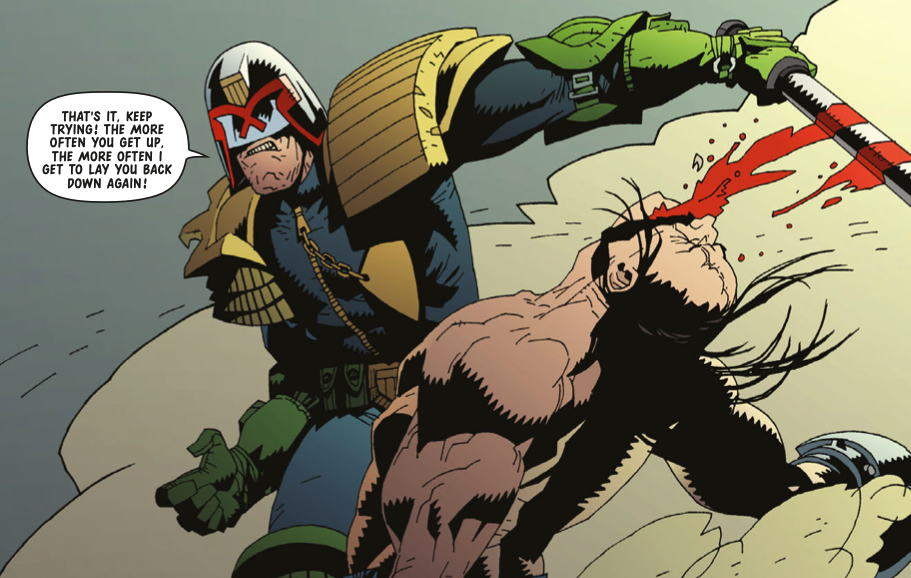
0:00:00-0:01:58: With great speed, we get into the fact that we’re covering Judge Dredd: The Complete Case Files Vol. 35, featuring material from 2002’s 2000 AD Progs 1276 through 1301, and Judge Dredd Megazine Vols. 4 #7 through 13, by a lot of different creators, including Alan Grant, which brings us to…
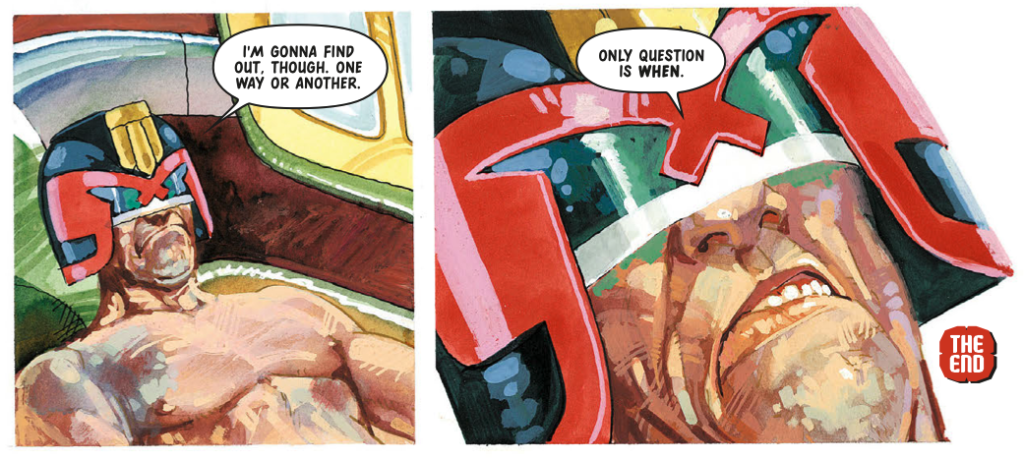
0:01:59-0:09:06: How bad are Alan Grant’s stories in this volume? Enough to get me starting the episode by complaining about his first two entries in the book, although my particular complaint that he’s trying to get some recurring threats going is deflected by Jeff pointing out quite appropriately that Gordon Rennie also seems to be trying something similar in his first story in the book. Could this be an editorially-led decision, and if so, are we properly entering the era of so-called “modern Dredd”?
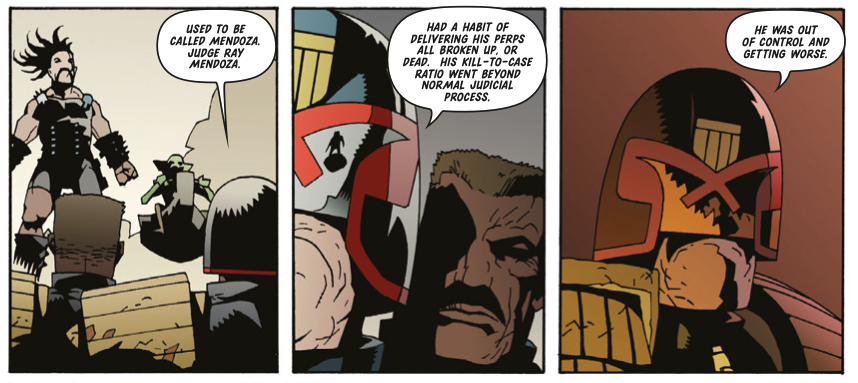
0:09:07-0:17:40: In true Wait, What? fashion, we get derailed from our conversation about Judge Dredd to talk about two entirely different 2000 AD moments: first, the 1980s “behind the scenes” strips featuring fictional editor Tharg the Mighty and the relatively fictionalized “creator droids,” which are truly wonderful and deserve to be reprinted as soon as possible, and secondly, the early 1990s reboot of Rogue Trooper, and in particular, the Michael Fleisher-written, Ron Smith-drawn episodes that followed immediately after Dave Gibbons and Will Simpson rebooted the concept. Mistakes were made, and I’m not referred to me for bringing it up in the first place. (Seriously, though, why would editors go for Ron Smith?)

0:17:41-0:43:00: Jeff asks what I thought of the book, so I tell him. Thankfully, we both liked it a lot, and we start going through some of the reasons why, including John Wagner’s unexpectedly nostalgic run of three stories in the middle of the book, starting with “Leaving Rowdy,” a genuine pleasure with some great Carlos Ezquerra art. We talk about Ezquerra, and also about how we feel about Rico, Dredd’s recently-introduced younger clone — how does he compare to Kraken, and what does that say about Dredd himself, as well as where John Wagner’s mind is at when writing these stories, versus when he was leading up to Necropolis? Also! Jeff isn’t down with Dredd’s guilt over the death of Judge Lopez back during The Judge Child Quest, but is it because he also hates men with mustaches?
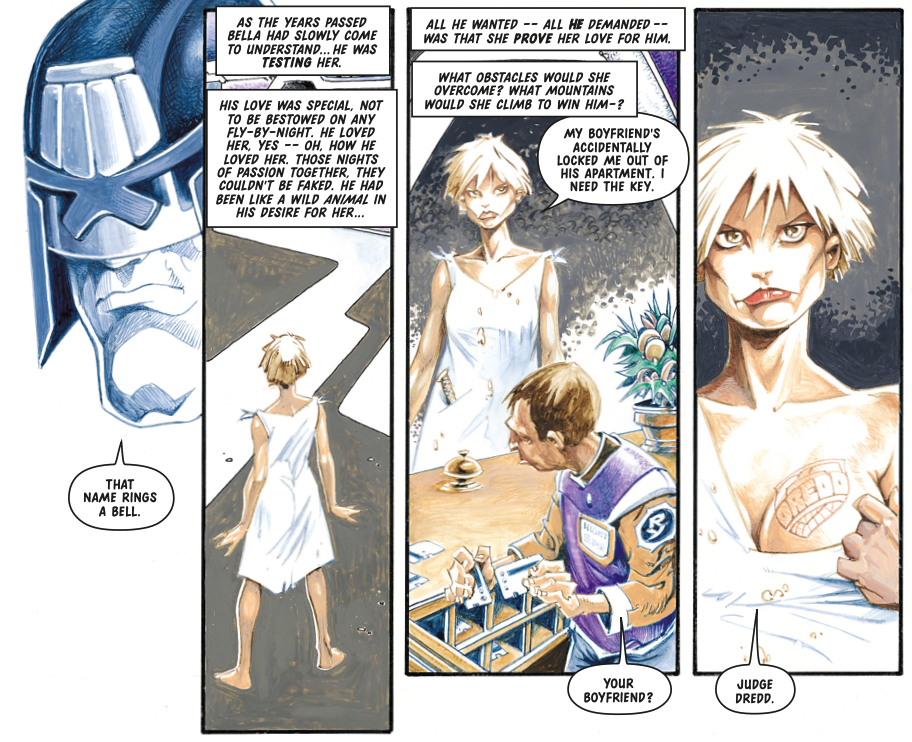
0:43:01-1:09:34: We work our way through much of the rest of the book in order, unusually, touching on such topics as: Ian Gibson, cheesecake artist or pervert? What is the correct way to draw a zipper on someone’s head? Why are some of these stories longer than they should be? Is Paul Marshall just too dull to make the most of “Escape from Atlantis”? What’s with the Don King reference that just doesn’t pay off, and did Alan Grant get Don King mixed up with Stan Lee somehow? Jeff’s pinball obsession finally pays off! And, of course, the all-important question of, “what subject is just too mean for Judge Dredd, at least according to Graeme and Jeff?” The answer to that last one may genuinely surprise you; to be honest, I think it surprised us as we were discussing it.
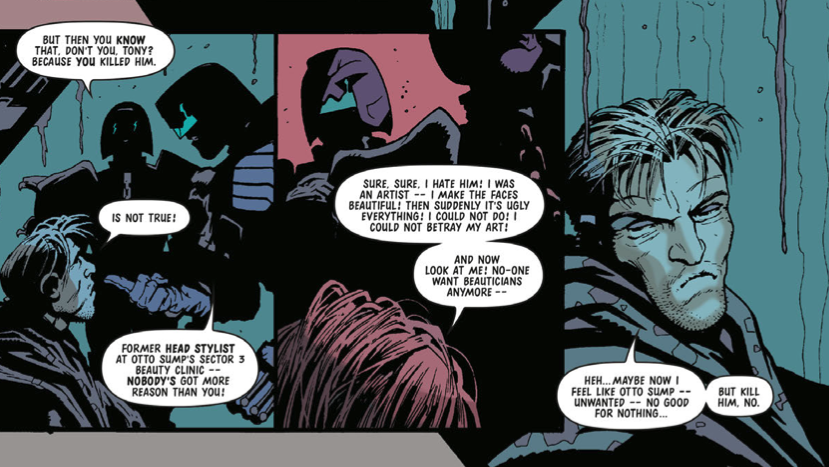
1:09:35-1:20:44: All of the last near half-hour leads us to a good place, though, as we get to talk about “Citizen Sump,” the highlight of the entire volume and the best Dredd story we’ve seen in a long time. How good is it? Well, Jeff suggests that he prefers it to Citizen Kane, the obvious (and clear) inspiration for the story, but he’s got good reason to: John Wagner delivers a blinder of a story with an absolutely heartbreaking climax, while John Higgins’ artwork channels Will Eisner’s The Spirit and film noir in ways that go beyond the cliches. It’s just really, really good stuff.
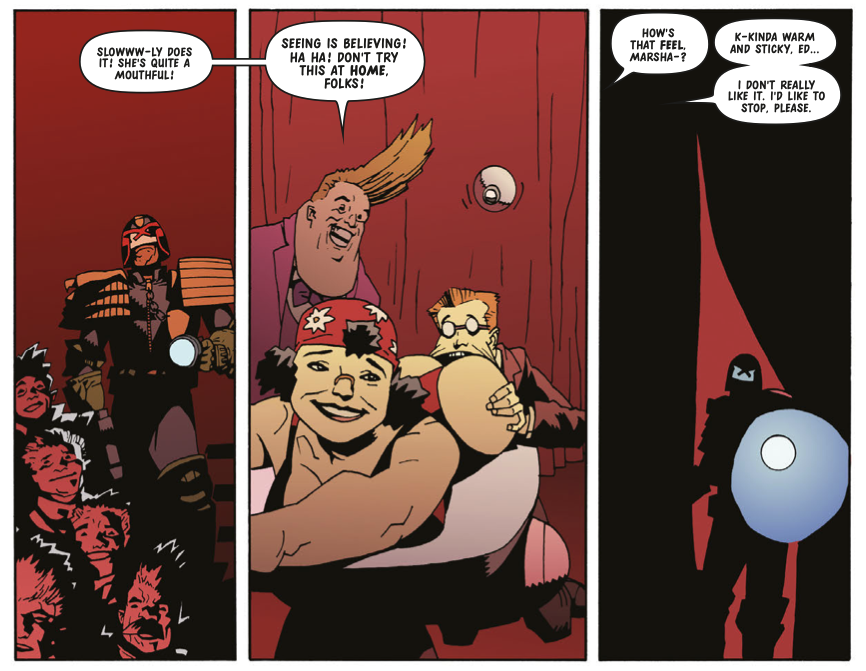
1:20:45-1:46:27: As I put it, from the sublime to the ridiculous, as we end by talking about “Sin City,” the longest story in the volume and the one that Jeff has arguably the most problems with. But is much of what he’s struggling with a bug or a feature? It depends on how willing you are to give John Wagner credit for thematic elements that might be entirely accidental, in practice. (Is he ripping off earlier stories to comment on Las Vegas recycling cultural landmarks? Or is he just ripping off old stories?) We also talk about Kev Walker’s art without my actually getting around to defending it — I really like his art here, I just didn’t say as such on the recording — and there’s a brief mention about the strange case of future echoing that happens here, too.

1:46:28-1:51:19: We’re beginning to close things up, so we talk about our favorite stories in the book — “Citizen Sump” for both of us — our favorite non-Wagner story (both of us plump for “Necrophage,” in which Gordon Rennie’s story is helped significantly by John Burns’ art), and our least favorite stories in the book, too. (Jeff putting “Block Court” on that list is still troubling to me.) In case you can’t tell by now, we also both plump for the Drokk side of Drokk or Dross, as well.

1:51:20-end: The end is near, which means it’s time to finally, properly promise that Dredd/Aliens crossover in the next episode — it’s in Case Files Vol. 36, even though I was convinced it came earlier — before we talk Twitter, Patreon, and I turn out to be entirely correct in suggesting that these show notes were going to be late on Monday. It’s been quite a day, that’s all I can say…! As always, thank you for reading and listening. We’ll be back in a month with some xenomorph action…


Please excuse the wait for this one, but for those still waiting for a direct link, here it is: https://theworkingdraft.com/media/Drokk/DrokkEp39.mp3
I always enjoy Kiev Walker’s art… Jeff mentioned Munoz (who Giffen swiped) as an influence on Risso, but he was also an influence on Miller, who went hard on chiaroscuro for Sin City, which would’ve been big at the time. By this point Mike McMahon was doing his more angular work w/solid blacks, which probably influenced Walker too. And of course, Mignola was hitting hard also, though I think he came by that look rather organically (you see it evolve over his time at Marvel and DC. That look was in the zeitgeist is what I’m saying.
And since I’m just barely on topic here, I’ll thank Graeme for recommending Lawless. It’s really fun stuff!
Kiev? Stupid autocorrect
Kyiv, Nate. Jesus.
(That was a joke, in case it wasn’t clear.)
Scattered thoughts:-
– Again, I think it’s important to remember that, at this point, what Dredd did in the Apocalypse War hasn’t been redefined from what it was in that story: the only way to prevent East-Meg One from winning a war that it was about to win and conquering what was left of Mega-City One.
Worth remembering that at no point has the US ever said that it would reserve the use of nuclear weapons for an equivalently extreme situation, one in which national survival as an independent country was at stake. The US doesn’t even have a “no first use” position for nuclear weapons, let alone an “if there is no other alternative to total defeat and subjugation” position. The official position is “in extreme circumstances to defend the vital interests of the United States or its allies and partners.” (Emphasis added.) That’s a much lower bar than the one that Dredd meets when he presses the button.
Not saying that Dredd shouldn’t feel guilty, and the Apocalypse War is going to get redefined (retconned, in fact). But as of *this* volume, it might be a little hypocritical to be too critical of Dredd while Jeff Lester’s taxes, and mine, are paying for the US’s ability and willingness to pave other countries’ cities over with radioactive glass much more casually than Dredd does.
– I rather liked Block Court. We have a lot of the judges being basically police; it’s quite fun to see Dredd wrestle with being a judge for once.
– I had Tornado #1 at some point when I was very young, I’m pretty certain. Its appearance here is an interesting little document of how this strip now presumes a nostalgic reader with a knowledge of the British comics past that extends quite a bit back.
– Flippers might be my favourite story here, after Citizen Sump. It’s a solid little police thriller. Nothing especially good or clever about it, but no actual mistakes in the execution.
I love a good spelling joke, especially when the humor derives from global politics!
Regarding Leaving Rowdy, I’m going to steal a bit Douglas Wolk wrote about that story:
“[I]ts first emotional zinger is Dredd’s memory of having selected Lopez to die in “The Judge Child,” and its darker one is a reference likely to be lost on anyone who wasn’t paying close attention during “Necropolis”: Dredd gives Rico II his copy of his Comportment with his handwritten notes. That’s the same copy Kraken was reading during his breakdown, when he saw Dredd’s note in the margin: “What about the big lie?”–which I think is one of the key moments in the entire series, the moment at which we discover that even Dredd understands that the Judges’ authority isn’t legitimate.”
Which is great on so many levels, but also something absolutely easy to miss even by long term readers. I don’t think either of you mentioned that note in Dredd’s comportment way back during the Necropolis episode, and it’s not something brought up in this story. It’s absolutely something that the reader has to remember. Jeff mentioned being sceptical of viewing Dredd, especially early on in the series, as having any sort of psychological depth, but between the notes in his comportment and his long history of training and advocating for proteges who end up climbing the ladder to perhaps reform the judges are great examples of pulling retcons that fit together almost too well, and is something Wagner leans harder and harder on all the way through Day of Chaos.
Which, as Graeme says, Sin City is very much a dry run for. It’s fascinating to see Wagner continue to chew over Dredd nuking East Meg 1 over the years. It’s worth noting how, when Orlock put Dredd on trial in Case File 30 and the Narcos story, Dredd and Anderson basically dodge the question and blow up the Kremlin. As Jeff said, here Dredd still refuses to look at what he’s done in the face, despite the events of the story being his fault. It’s like Wagner knows Dredd did wrong, but can’t fully figure out how to address that head on without derailing the strip. The Sovs aren’t going to invade again, because that’s just the Apocalypse War again, nor can Dredd be sent to a Sov iso-cube for life without ending the strip. And so Wagner continues to chew on the implications of a decision he and Grant made when they were much younger, and didn’t figure the strip would last more than a few years so why not go as far as they can?
The last thing I’ll say is that, while I like where Wagner ends up with Vienna, Jeff’s right that her return is weak sauce. I don’t know what else Wagner could have done with the character, given she really doesn’t make sense in the timeline with Rico, nor does the idea of Dredd occasionally visiting a precotious child appeal. I’m willing to forgive a weak start to her return for what she brings to the series later. Though I do love that Wagner’s justification for her disapearance over the last twenty years ends up mirroring why Dredd never bothered to check in on her: Neither of them had any idea what to do with her, or how to relate to her, so they just ignored her. Great example of the creator/creation unifying in the moment.
I was just noticing that this august is the 20th anniversary of the Waid and Ringo run on the FF. Might be a fun time to bring back Baxter Building for a month?
Finally getting around to this episode. Some notes:
1. “It’s the Muppet Show with our very special guest star, Judge Dredd!” A+ I want this to happen.
2. I am amazed at Jeff’s ability to recognize the pinball machine. Well done!
3. I really thought the guy eating the woman in Sin City was the character from the earlier story and was kind of sad to learn that it wasn’t.
4. I definitely saw Kev Walker’s art as being more Mignola inspired, though after your discussion of Eduardo Risso I wonder if I missed that connection because I read 100 bullets in the collected reprints that (if I recall correctly) were from the era when all Vertigo trades used terrible paperstock so that the blacks weren’t as “black” as the ones in this story (that I read digitally) or Mignola’s (that I read printed on nicer paper).
5. I think Jeff is underestimating the interest people would have in a floating Las Vegas. If something like that floated up to San Francisco I think a lot of people would want to go if for nothing else, the novelty of it. One thing that’s come up again and again in Dredd is that the people of Mega City One are mostly unemployed and bored, so I can see them wanting to go a bright, shiny place,.even if it didn’t offer anything “new.”
Also, as much as I’ve really enjoyed these last few years of reading along with Dredd, I’m also ready for you to do something else. New Teen Titans starting with Woflman/Perez perhaps? (There’s like 14 volumes available on Hoopla!)
I had some supply chain issues with getting my physical copy of this Case Files, so I am way behind. (Volume 36 won’t arrive until August, so I’m SOL for keeping with this show for the foreseeable future. Alas!)
I remember you both were running out of steam when discussing “perfectly serviceable Dredd,” and the only thing that could get an extended discussion out of you was bad Dredd. Glad to see this episode bucked that trend. This was a really fun listen!
Before I vomit up scattered thoughts, I wonder if our hosts, like me, have a lower tolerance for “perfectly serviceable” one-offs because we’ve seen so many permutations of them, but when Wagner really digs into the themes and concepts, focusing on the long-term story, well, then you’ve got something to sink your teeth into. It’s a shame that Dredd is an IP and can never being story with a definitive conclusion. That would be so satisfying.Part of the appeal was that Dredd was aging and, yes, changing, in pretty much real time, but it seems they’ve done away with that conceit, much to the detriment of the storytelling, I fear. I think this akin to ’70s – ’80s Marvel when they stopped allowing the characters to age once they realized they could have Disney-like perpetual IP on their hands. (Franklin Richards will never see and age beyond 10 barring some time travel shenanigans.) Perhaps that’s why you’re so cool toward new Dredd writers, many of whom write serviceable Dredd stories that are *fine*, but if they had appeared in the first 10 volumes, we probably would be saying they were great. But now we demand more of our Dredd stories now. We don’t need any more superficial world building. We want, nay, demand Necropolis and Apocalypse War-level epics.
Time for the random thoughts!
-Necrophage: Agreed with everything said, but I couldn’t help but wonder if this was the first post-9-11 story to obliquely reference it. Dredd says MC1 will always be dealing with the fallout of the Necropolis incident, and I couldn’t help but wonder if Wagner was talking about 9-11. (Honestly, though, MC1 has been through *multiple* 9-11 events on an order of magnitude, and Necropolis was just one of them.) Since around the time this was published, many a person was already discussing, sometimes vaguely, that 9-11 was somewhat of the chickens coming home to roost. The text in Necropolis clearly blames the citizens for succumbing to the three witches and then the Dark Judges. I wonder if this was Wagner’s attempt to address the circumstances surrounding 9-11 and its long-reaching effects.
-Citizen Sump: Not usually a fan of “Citizen Kane” parodies or pastiches, because they’re usually poorly done. They think just by using the word Rosebud they’re be able to steal some of the greatness of that film for their own mediocre work. This one, however, got me, and it was really well done. It’s a shame they killed Sump off-panel, but I did like how Dredd got his criminal, but didn’t really solve the mystery. I feel like that’s something you could only get away with in a Dredd story.
-The first three stories that were all set-up: I don’t disagree with what you said. I can imagine the pain of reader who had to read them weekly without the benefit of 200 other pages of Dredd to satisfy them. I hope the other features in those progs compensated for the damp squib that was these stories. That said, I have to say I felt that way when we had the first PJ Maybe story. It was only by dint of having a couple other PJ Maybe stories in the same Case Files that i was able to overlook the “all set-up, no payoff” nature of the first Maybe tale. If I had been reading it weekly I would have hated the story. Which makes me wonder: we keep evaluating the stories based on their collected editions, but they were never intended that way originally. Both our hosts lamented this volume ending with that George Lucas story, but it was never written to be the last story in a volume of Dredd tales, just one of a few tales in the Megazine. Are we being unfair in judging it as a collection each month, because these strips were never intended to be a collection in the way, say, “Watchmen” was?
-Sin City: Everything you said about this one was on the money. I liked it overall, but I didn’t read it twice. One problem I had was the pacing. And I’m not talking about the kitchen sink approach Wagner took; I’m talking about how I felt like a number of pages were missing panels and information was being unfairly withheld from me as a reader. Don’t know if that’s because Wagner overstuffed it and didn’t give the elements room to breathe, or Kev Walker’s cartooning wasn’t up to handling the pacing.
-Leaving Rowdy: You said there was a degree of “reliving the hits” in this volume, especially in Sin City. Now, I might be going crazy, but I got a huge sense of deja vu from this story EXCEPT for the ending. Amy I losing my mind or was there another story where Dredd turns over his old apartment to another judge, specifically a Dredd clone? Granted I had that same feeling when we got a second story of a lobotomy gang attacking a hotties stand. But I think one of the case files reprinted a strip that had been included in an earlier volume once, so maybe that happened here.
-A Royal Occasion: I can’t believe you didn’t discuss this one. This felt like classic Dredd satire of American political hegemony. There’s no cowardice here, in that there’s no subtext. Dredd comes out and says, “Don’t forget, creep. If it wasn’t for the protection we gave you, you’d either all be speaking Sov or your dumb little antiquated island would have been nukes off the face of the planet a long time ago!” He then follows it up by giving the formal diplomatic greeting to the queen. And let’s not forget the cliche by richly deserved lambasting of the royal family. I don’t know about you, but this one gave me the satire vibes I crave from Dredd and gave me hope that Gordon Rennie might be a proper inheritor to Wagner’s savage wit. I suppose Graeme knows for sure if that pans out.